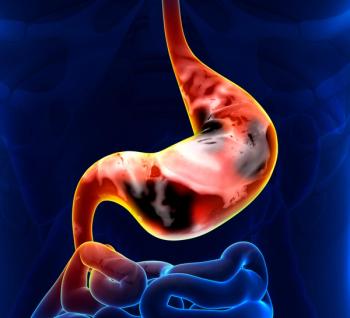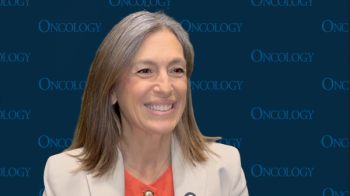
First-Line Ramucirumab Delays Progression in Gastric, Gastroesophageal Junction Adenocarcinoma
First-line ramucirumab in combination with chemotherapy significantly improved progression-free survival in patients with metastatic gastric or gastroesophageal junction adenocarcinoma, according to results of the RAINFALL trial.
First-line ramucirumab in combination with chemotherapy significantly improved progression-free survival in patients with metastatic gastric or gastroesophageal junction adenocarcinoma, according to results of the RAINFALL trial (
“In patient with treatment-naive gastric and gastroesophageal junction adenocarcinoma, the addition of [ramucirumab] to first-line chemotherapy conferred a significant improvement in the primary endpoint of investigator assessed progression-free survival, but did not confer any improvement in overall survival,” said Charles S. Fuchs, MD, MPH, of the Smilow Cancer Hospital and Yale Cancer Center in New Haven, Connecticut, who presented the results.
According to Fuchs, vascular endothelial growth factor receptor 2 (VEGFR2)-mediated signaling and angiogenesis appear to play an important role in gastric cancer pathogenesis and progression. Ramucirumab is a monoclonal antibody receptor antagonist designed to bind to the extracellular domain of VEGFR2, thereby blocking VEGF binding and inhibiting receptor activation.
In the second-line setting, two placebo-controlled trials have demonstrated significant improvement in overall survival with ramucirumab as a single agent and in combination with paclitaxel. Given these documented benefits in the second-line, the researchers wanted to examine the efficacy of ramucirumab in first-line treatment.
The RAINFALL study included 645 patients diagnosed with metastatic gastric or gastroesophageal junction cancer. All patients had ECOG performance status of 0 or 1 and were eligible for first-line chemotherapy. All patients received capecitabine (or 5-FU) plus cisplatin and were randomly assigned to either ramucirumab or placebo every 21 days. Treatment was given until progression or unmanageable toxicity.
The primary endpoint was investigator-assessed progression-free survival in the first 508 patients. In this group, ramucirumab in combination with first-line chemotherapy resulted in a 25% reduction in risk for disease progression or death compared with placebo (hazard ratio, 0.75; 95% CI, 0.61–0.94). The median progression-free survival was 5.72 months for ramucirumab compared with 5.39 months for placebo (P = .011).
“This improvement in progression-free survival persisted in the full 645 patient cohort with a stratified hazard ratio for progression or death of 0.75,” Fuchs said. The median progression-free survival was 5.85 months for ramucirumab compared with 5.55 months for placebo (P = .0024). However, compared to placebo, ramucirumab did not confer an improvement in overall survival.
The researchers also examined whether the effect of treatment differed by patient subgroup. The benefit of ramucirumab on investigator-assessed progression-free survival appeared consistent across virtually all subgroups examined, Fuchs said. However, no significant improvement in overall survival was seen among any specific subgroup, and there were no significant differences in objective response between the two study arms. The overall response rate was 41% for ramucirumab and 36% for placebo.
“Ramucirumab in combination with first-line chemotherapy did appear to be well tolerated,” Fuchs said.
Deaths due to adverse events were similar across treatment arms. In addition, treatment-emergent adverse events were relatively similar between the two arms, but ramucirumab was associated with a slightly higher rate of hand-foot syndrome, thrombocytopenia, and decreased appetite. Febrile neutropenia was modestly higher in the placebo arm.
Newsletter
Stay up to date on recent advances in the multidisciplinary approach to cancer.
Related Content
















































